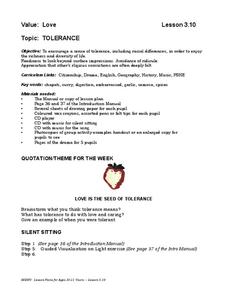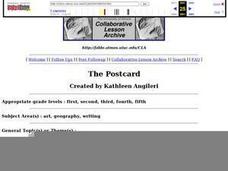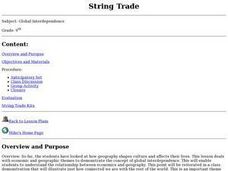Curated OER
The Pirates of the Caribbean
Third graders participate in a demonstration lesson that shows a map of the Caribbean Islands. They examine a natural resource that each island is known for. Next, they listen to a read aloud of Gail Gibbons, "Pirates: Robbers of the...
Curated OER
Jacksonian Democracy
Young scholars determine how technological advancements have formed history. In this Jacksonian democracy lesson, students research innovations of the era and then compare them to the technological innovations of today. Young scholars...
Curated OER
Goldilocks and the Three Hares
Students read the book Goldilocks and the Three Hares and complete activities to go along with it. In this Goldilocks and the Three Hares lesson plan, students complete activities on puns, facts about weasels, rabbits and hares, and more.
Curated OER
Tolerance
Students are encouraged to have a sense of tolerance, including racial differnces, in order to enjoy the richness and diversity of life. They are shown readiness to look beyond surface impressions. Students appreciate that other's...
Curated OER
The Postcard
Students listen to the book "Kate on the Coast" and plot her journey on a map. Then they decorate, address, and write a message on a postcard. They discuss where the postcards are being sent and plot the destinations on map.
Curated OER
Lesson 1: Culture and Resource Use
Young scholars research an aspect of Wabanaki culture that has persisted in Maine throughout the years. They write a conversation between a Wabanaki person and an English person that shows the different cultures and negotiates a solution...
Curated OER
Patriotic Arts: Influencing Canadians At War
Students study how war has shaped Canadian life, patriotism, propaganda, and music. They research primary source documents, novels, videos, and songs before celebrating Remembrance Day.
Curated OER
The Ocean Floor
Fifth graders discuss the process of sedimentation and the continental drift theory. They locate major structures on the ocean floor and they identify life forms at each level of the ocean.
Curated OER
There Is No Place Like Home! U. S. Immigration in the 1800's.
Students explore immigration in the late 1800's. They identify and describe the settlement patterns of European immigrants to the U.S. Students work in groups to research immigration from specified countries.
Curated OER
My Community
Students engage in a lesson plan about the community in order to find out what different things go on within it on a daily basis. They conduct field research and look up information in order to answer some key questions addressed.
Curated OER
Failing Ecosystems: Haiti and the Caribbean
Ninth graders study the impact that climate has on the land. They discuss how deforestation leads to erosion and soil damage and how trees and vegetation help to stabilize the land. They draw a large map of the Caribbean and show Haiti...
Curated OER
Database Scavenger Hunt
Students create a database to show information about events in history. In this database lesson, students create and analyze information on the slave trade. Students answer questions based on the information collected.
Curated OER
Injustice on Our Plates: Immigrant Women
Students investigate the plight of undocumented workers. In this social justice lesson, students research undocumented workers as well as consumer boycott movements and write about their impressions.
Curated OER
H4 Homework Assignment #33-34
In this global studies worksheet, students read the noted pages in their textbooks and then respond to 1 essay question about women in society.
Curated OER
Value: Love, Topic: Friendship
Sixth graders participate in a skit, "Henry Gets it Right." They discuss the skit and qualities of a friend. They discuss an example of a wild animal taking care of animals of a different species. They consider the behavior versus the...
Curated OER
Forgiveness
Students brainstorm what they believe forgiveness means. Individually, they write about a time in which they forgave someone and how it made them feel. To end the lesson, they participate in a role play activity in which they must...
Curated OER
Transpiration
Students interactively explore the term transpiration. In this science/ecology lesson, students discuss what they would do if they were thirsty while conducting research in Brazil. Additionally, students write descriptive words to...
Curated OER
Looking at Our Community
High schoolers analyze the way that the media views the community that they live in. They poll residents about the strengths and weaknesses of their community and devise ways such as community service projects that they can improve the...
Curated OER
Migration
Pupils gain a deeper sense of how culture is transmitted from one society to another. They emphasis on migration as one means of such transmission. Students look at reasons why people choose to leave their home countries and how their...
Curated OER
Why People Move
Fourth graders investigate within their family structure where their relatives have moved or migrated from. They compare/contrast this data with other students. Students map out their finding. They interview family members.
Curated OER
String Trade
Ninth graders discuss the concept of imports and exports in trade. They participate in a simulation that explores the interchange and relationships between natural resources, scarcity, politics and tariffs.
Curated OER
Fred the Fish
Students read and retell the story of Fred the Fish. In groups, they create their own story of a similar nature and identify a situation in their community like the one in the story. They create possible solutions to the problem and...
Curated OER
Making Sense of the Census
In this unit of lessons, learners make sense of the census. They examine why a census is taken and participate in activities.
Curated OER
Exploring Nations
Students, in groups, research countries in East and Southeast Asia. The group designs an oral presentation and PowerPoint slideshow to showcase research on landforms, political and economic issues, global interaction and special-purpose...























